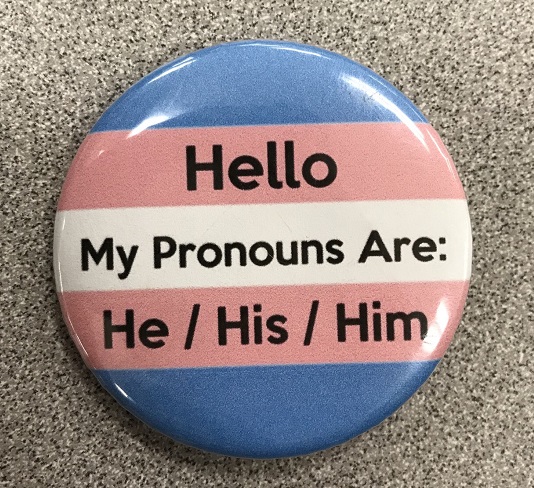Transgender: more than flesh and bone

A pin that has the transgender flag on it as well as it’s wearer’s preferred pronouns
April 2, 2020
Transgender and cisgender are most likely two words the majority of readers will not know, even though they can be important parts of their lives. According to the database Info Base Learning, cisgender is defined as when someone’s identity and gender match their birth sex. This is in comparison to transgender, which is someone whose identity and gender do not match their birth sex.
To clarify, gender and sex are two different things. According to the Health Reference Center, sex is someone’s chromosomes (XY, XX and in some rare cases XXY) while gender is the way you portray your sex (such as with femininity, masculinity, and androgyny.) People who are transgender feel a disconnect between their gender and sex. This is different from a woman who prefers to dress and act more masculine or a man who prefers to dress and act more feminine as they still identify with their sex.
People who are transgender can realize they are trans at any time of their life, from when they are small children to when they are fully adults. A defining trait for people who are trans is gender dysphoria, defined by the American Psychiatric Association as the feeling of discomfort or distress because the person’s biological sex doesn’t match their gender identity. A student who identifies himself as trans explained: “Dysphoria is the great discomfort that comes with your body not matching your brain. It feels like my body isn’t mine, and I would always feel as if I wanted to tear off my skin.”
Another student reported: “I can’t really explain what it is, but it feels like constant hate of your body and feeling uncomfortable in your own skin.”
There are many ways to help ease the discomfort of gender dysphoria, as explained by the students who were interviewed for this article, whether that be wearing a binder (an item that helps bind the chest to make it look flat for men who are trans), cutting or growing out hair, wearing unisex clothing, going on hormone blockers, or getting surgery to help replicate the appropriate gender. It all depends on what the person is willing to do/can do as well as if they can afford such procedures.
Gender dysphoria is one of the many issues that trans people face, as well as people not accepting them for who they are. Since being transgender isn’t something most know, it can often lead to ignorance and believing that this “isn’t normal.” People who are trans are often challenged by people wanting them to prove that they are what they say they are or even worse, be threatened, harmed or even killed. While some friends and family are accepting and are willing to give support, not everyone is lucky and can risk being kicked out of their homes or removed from their family because they are transgender.
With that in mind, people who are transgender may legally change their gender. It involves paperwork and (if they are a minor) parent/guardian permission, but a student would be able to legally identify as transgender and would aid in being able to mark themselves as transgender if they are filling out legal documents. If you want to know more about this, talk to your school guidance counselor for more information.
While unfortunately, not every student that is transgender will be able to do the paperwork (as not everyone can get permission from their parents/guardians), it’s still important to know that they are still valid in identifying themselves as trans and being transgender is not a choice. They are not doing this for attention, it’s just a part of who they are, similar to how a person who is cisgender feels about their identity. With this, readers should acknowledge this information and, if they ever encounter someone who is transgender, respond with an open mind and be respectful.
As for readers that are transgender, know that you are not alone and that there are other people that are trans in our area. When asked if they have any advice for people experiencing similar situations, a student who considers himself transgender recommends: “Talk to someone, even if it’s your friends it helps that someone knows”
Another said: “I want to tell the others that it is okay. Just cope the best you can until you move out. Don’t give up!”
While being transgender is still a topic not a lot of people understand, this article is written in hopes to spread some information about it; trying to aid in making readers more aware and accepting of it. Knowledge is power and hopefully one day that power will someday be enough to make the world easier for people who are trans.

